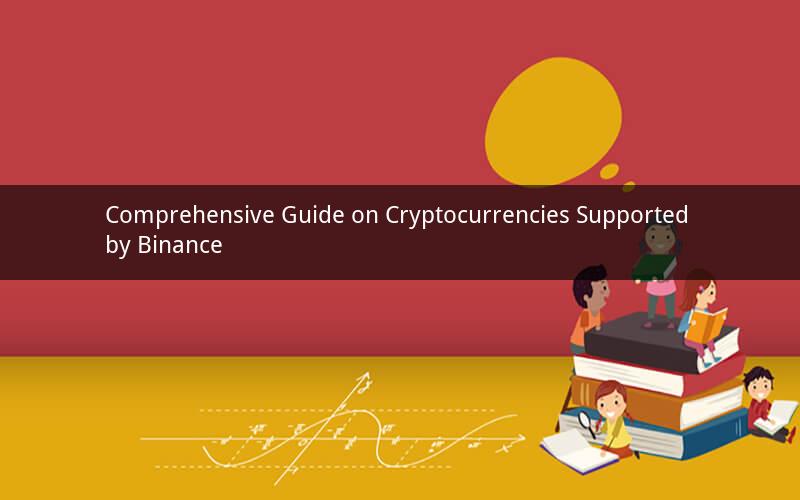
Binance, as one of the largest cryptocurrency exchanges in the world, offers a wide range of digital assets for trading. In this article, we will explore the various cryptocurrencies supported by Binance, helping you make informed decisions when it comes to trading and investing.
1. Bitcoin (BTC)
As the first and most popular cryptocurrency, Bitcoin is naturally supported by Binance. Launched in 2009, Bitcoin has gained widespread recognition and remains a cornerstone in the crypto market.
2. Ethereum (ETH)
Ethereum, known for its smart contract functionality, is another major cryptocurrency supported by Binance. It allows developers to build decentralized applications and is widely used for transactions and investments.
3. Binance Coin (BNB)
Binance Coin, the native token of the Binance platform, is also supported by the exchange. It serves various purposes, including paying for transaction fees, participating in token sales, and gaining access to exclusive services.
4. Ripple (XRP)
Ripple is a cryptocurrency designed for fast and affordable international money transfers. Binance supports XRP, making it easier for users to trade and invest in this popular digital asset.
5. Litecoin (LTC)
Litecoin is often referred to as "silver to Bitcoin's gold" and is supported by Binance. It was launched in 2011 and is known for its faster block generation time compared to Bitcoin.
6. Bitcoin Cash (BCH)
Bitcoin Cash is a hard fork of Bitcoin, created to address some of its limitations. Binance supports BCH, allowing users to trade and invest in this alternative cryptocurrency.
7. Cardano (ADA)
Cardano is a blockchain platform that aims to offer a more sustainable and scalable solution for decentralized applications. Binance supports ADA, enabling users to trade and invest in this innovative cryptocurrency.
8. Chainlink (LINK)
Chainlink is a decentralized oracle network that connects smart contracts to real-world data. Binance supports LINK, allowing users to trade and invest in this critical infrastructure for the crypto ecosystem.
9. Polkadot (DOT)
Polkadot is a protocol that aims to connect multiple blockchains and enable interoperability between them. Binance supports DOT, enabling users to trade and invest in this transformative project.
10. Stellar (XLM)
Stellar is a blockchain platform designed for cross-border payments and asset exchanges. Binance supports XLM, making it easier for users to trade and invest in this digital asset.
11. Tezos (XTZ)
Tezos is a self-amending blockchain platform that aims to enable the creation of decentralized autonomous organizations. Binance supports XTZ, allowing users to trade and invest in this innovative project.
12. Uniswap (UNI)
Uniswap is a decentralized finance (DeFi) protocol that facilitates decentralized token swaps. Binance supports UNI, allowing users to trade and invest in this important DeFi project.
13. Chainlink (LINK)
Chainlink is a decentralized oracle network that connects smart contracts to real-world data. Binance supports LINK, enabling users to trade and invest in this critical infrastructure for the crypto ecosystem.
14. Polkadot (DOT)
Polkadot is a protocol that aims to connect multiple blockchains and enable interoperability between them. Binance supports DOT, allowing users to trade and invest in this transformative project.
15. Tron (TRX)
Tron is a blockchain platform designed for decentralized applications and entertainment content. Binance supports TRX, making it easier for users to trade and invest in this digital asset.
In conclusion, Binance offers a diverse range of cryptocurrencies for trading and investment. From the major players like Bitcoin and Ethereum to emerging projects like Cardano and Polkadot, users can explore various digital assets and find opportunities to grow their portfolios. Keep in mind that the crypto market is volatile, and it is essential to conduct thorough research before making investment decisions.
Questions:
1. What is the primary purpose of Binance Coin (BNB)?
2. Why is Ethereum (ETH) considered a major cryptocurrency?
3. What is the difference between Bitcoin (BTC) and Bitcoin Cash (BCH)?
4. How does Chainlink (LINK) contribute to the crypto ecosystem?
5. Can you explain the concept of decentralized finance (DeFi) and its importance in the crypto market?